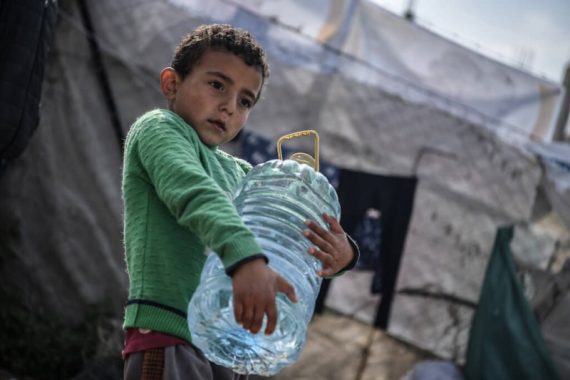A
n estimated 1.9 million people in Gaza, or 90% of the total population, have been forcibly displaced to the south as Israeli forces advanced on refugee camps. This has been occurring in the days and weeks following the beginning of the war on October 7, forcing Palestinians to escape the Israeli attacks and seek refuge without food, water, or adequate shelter.
Awni, a 70-year-old resident of Gaza City, sought refuge in the southern city of Rafah as heavy bombardment intensified in his residential neighborhood.
“Israeli troops ordered an immediate evacuation, creating a scene reminiscent of the 1948 catastrophe,” Awni stated.
Fleeing on foot for miles, he emphasized leaving everything behind due to the situation’s urgency. Awni highlighted the mental toll, stating, “When you feel death approaching, your mind freezes.”
1.5 million people have sought refuge in Rafah
According to the United Nations Office for the Coordination of Humanitarian Affairs (OCHA) around 1.5 million people have sought refuge in Rafah, bordering Egypt to the south. UN official Juliette Touma stated that Gaza’s humanitarian needs have significantly grown, but the UNRWA (United Nations Relief and Works Agency for Palestine Refugees in the Near East) faces restrictions in accessing certain areas in the Gaza Strip.
Awni, who sought refuge in a UN school, described a nightmarish experience, emphasizing the overcrowded and unsanitary conditions. Displaced for more than three months, he expressed a deep homesickness for Gaza and a longing for the familiar details of home.
The densely populated enclave faces escalating challenges, with an elderly man like Awni finding it extremely difficult to stand in line for daily meals from the UN-supported school. According to the UN, Rafah’s population density exceeds 12,000 persons per square kilometer.
U.S. Secretary of State Antony Blinken emphasized the right of Palestinian civilians to return home and criticized Israeli ministers advocating for the resettlement of Palestinians elsewhere. Tragically, more than 28,800 people have been killed in Gaza since October 7 and a further 56,165 Palestinians have been injured, according to the Hamas-run Ministry of Health.
Recommended
Living in the open in the freezing winter
Amidst the ongoing Israeli war, the plight of Gazans has intensified, particularly during the freezing winter in the south. Gada, a resilient mother of seven girls, escaped the Israeli bombardment in Jabalia, north of Gaza, only to find herself in Al Mawasi, a thin strip of mainly agricultural land along the Mediterranean coast near the Egyptian border.
In this already challenging environment, Gada struggled to find adequate shelter to protect her family from the biting cold. The scarcity of tents compounded their hardships, forcing eight people to share a meagre 3-by-3 meter space along with their belongings. Volunteers attempted to alleviate the situation by creating makeshift bathrooms nearby, but the reality remained harsh.
Living conditions for families like Gada’s have become unbearable, enduring freezing temperatures without proper shelter, sanitation, or access to essential resources. Many are forced to reside in temporary housing facilities like schools, where several dozen individuals occupy a single classroom. Others find themselves in waste grounds or open areas within compounds, either in tents or makeshift shelters.
Gada vividly described the nightmare of waking up to water dripping from the ceiling of their tent, saturating their clothes and possessions. The combination of inadequate shelter and the harsh winter weather have added a layer of suffering to an already dire situation.
While winter is considered a lyrical season by many, for Gazans living in these open and vulnerable conditions, it has become a haunting nightmare. The lack of proper protection against the cold poses severe health risks, especially for children and the elderly, making the need for urgent humanitarian assistance even more pressing.
As the international community grapples with the complexities of the Gaza conflict, the stories of individuals like Awni and Gada underscore the urgency of addressing the immediate needs of those affected. The freezing winter has intensified the suffering of Gazans, highlighting the critical importance of providing not only immediate relief but also sustainable solutions to ensure their well-being amid these challenging circumstances.





